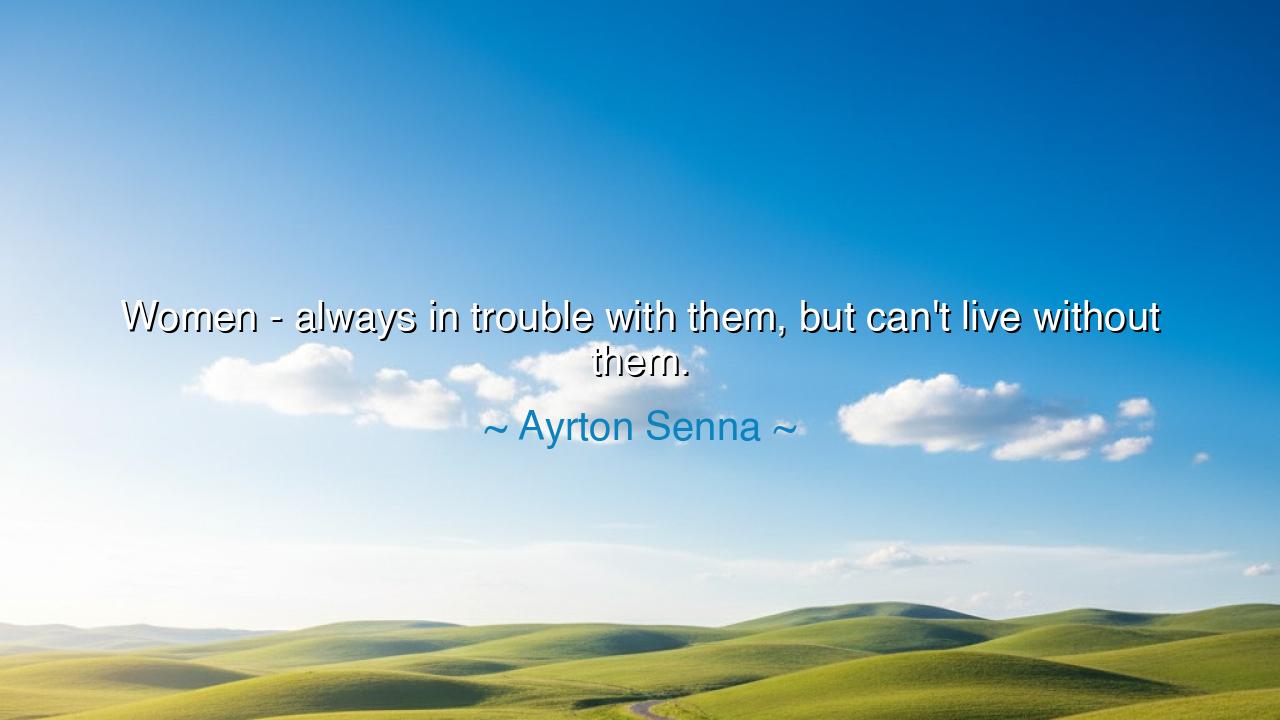
Women - always in trouble with them, but can't live without






The words of Ayrton Senna — “Women — always in trouble with them, but can’t live without them.” — are spoken with the candor of a man who knew both the storms and the light of the human heart. In his jest lies an eternal truth: that the bond between man and woman is both trial and treasure, both battle and sanctuary. To love is to invite trouble, for passion stirs conflict, misunderstanding, and longing. Yet to be without love is a greater poverty still, for then the heart knows no warmth, no song, no mirror of the soul.
The ancients themselves sang of this paradox. Recall Paris and Helen, whose union ignited the war of Troy. Their love was fire — destructive, irresistible, and fraught with peril. Yet even amid the ruins of kingdoms, poets still sang of them, proving that what causes trouble may also be what gives life its deepest meaning. To live without such love is safer, but poorer; to embrace it is to risk the tempest and yet to taste eternity.
Senna, a warrior of the racetrack, lived always at the edge between glory and death. It is no wonder his words about women bear the same spirit: that they are danger and salvation at once. Just as he could not abandon the risk of speed, he could not deny the necessity of love. For the human soul is not made for isolation. Even when relationships bring quarrels, confusion, or heartache, they also carry joy, tenderness, and the strength that sustains us in our darkest hours.
History offers gentler examples too. Consider Antony and Cleopatra: their love defied empires, entangled them in peril, and hastened their downfall. Yet across centuries their names remain inseparable, proof that some bonds, though costly, cannot be severed by reason. Their story, like Senna’s words, tells us that the heart chooses not what is easy, but what is essential.
Let the generations remember: to seek love is to embrace both laughter and tears. One cannot demand its sweetness without accepting its trouble. Yet to live without it is to wander a barren desert, unmoored and incomplete. Senna’s reflection, though cast in humor, is a teaching as old as time: that the very thing that tries us most is often the very thing that makes us whole. Thus love, like the race he once ran, is perilous — but it is also life itself.






THBui Thi Thuy Hang
Senna’s quote brings up an old, familiar idea: that relationships with women are difficult yet vital. While this may be an exaggerated take on love and partnership, how often do we hear similar sentiments about the challenges of relationships? How can we explore the nuances of these dynamics without reducing them to clichés about gender roles? What does it take to truly value women in relationships without turning them into a source of ‘trouble’?
VKDoan Van khng
Ayrton Senna’s statement plays on the idea that relationships with women are both frustrating and essential, but it misses the opportunity to highlight the beauty of partnerships built on respect and understanding. How often do we fall into this trap of romanticizing conflict instead of focusing on mutual growth? Shouldn’t we strive for a view of relationships where the connection is uplifting and rewarding rather than one that creates turmoil?
CNchi ngoc
While Senna’s quote might be trying to express the challenges of relationships in a playful way, it feels like it oversimplifies the role of women. Why are women so often portrayed as troublesome in certain narratives, yet seen as irreplaceable? How can we challenge this dichotomy and ensure that both women and men are equally valued in their relationships without falling into stereotypes or oversimplified views of gender?
TQNhu Tr Quynh
Senna’s quote seems to reflect a common sentiment about relationships that many may find relatable, but it also feeds into a stereotype about women being a source of trouble. Does this kind of thinking perpetuate negative dynamics in relationships? How can we change the way we speak about gendered relationships to ensure we’re promoting healthier, more equal perspectives that don’t diminish one party or the other?
TQThu Quynh
This quote from Ayrton Senna raises interesting questions about how men historically view relationships with women. It implies that relationships with women are full of struggle but also essential. Could this be an expression of the tension that often exists in love and partnerships, or does it reflect a more traditional view of gender dynamics? How do we shift the narrative toward understanding relationships as collaborative and not inherently problematic?